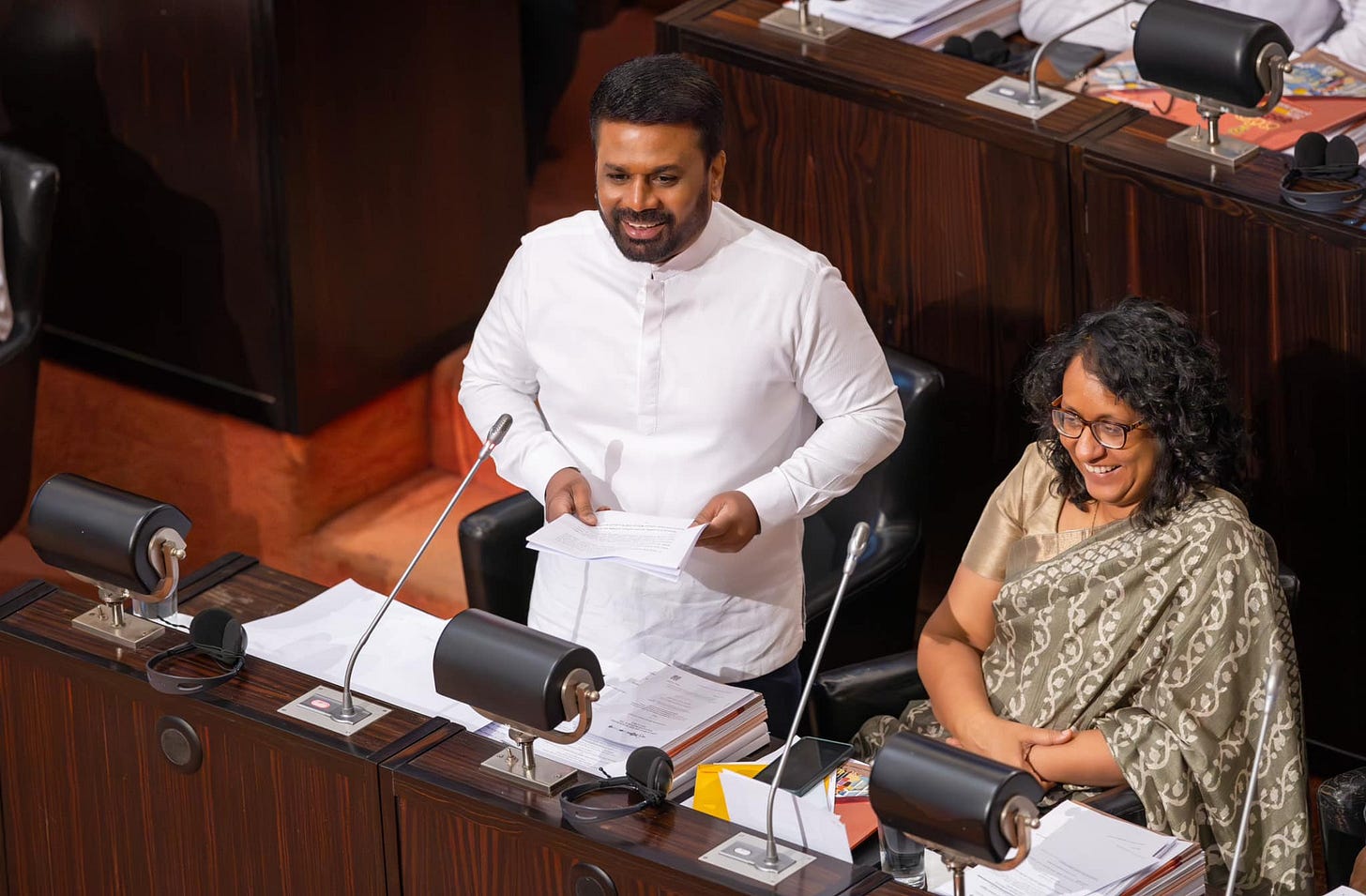It’s been less than a day and I certainly haven’t read the document in full, but I’m gonna jump the gun a bit and say that was a fairly decent budget, all things considered. This is not going to be an analysis of the actual bill. I’ll leave that to the experts. I just wanted to share my excitement about a few things, especially as someone who did not want the NPP anywhere near real power.
First of all, you gotta hand it to AKD for remaining pragmatic with the finance portfolio since day one without appeasing the lunatic anti-IMF fringe of his coalition. In the run-up to the polls, Discount Dhananjaya Siriwardena and half of Colombo’s leftist chattering classes who were counting on the NPP to deliver their anti-Western commie utopia had been threatening, begging, cajoling the new government to renegotiate the IMF’s debt sustainability analysis (DSA), which AKD promptly ignored upon coming to power. He also didn’t hesitate to retain Treasury Secretary Mahinda Siriwardena’s services and, though he is powerless to remove the CBSL governor, has maintained a cordial working relationship with Nandalal Weerasinghe. This was despite the hideous allegations levelled at these two excellent and exemplary public officials by NPP front-runners and sometimes AKD himself. As he said in the budget speech today, the president recognised that the debt restructuring process had to continue unhindered, as repeatedly pointed out by his critics; kudos to him for making sure that happened without a hitch, election rhetoric be damned.
In fact, since his inauguration, all indications were that President AKD was going to be a very different man to Presidential Candidate AKD. He proved that today beyond any doubt. Long may he continue to do just that.
Back to Budget 2025: AKD anticipates 5% growth in 2025, and he’s also committed to a 2.3% primary surplus to ensure that we are “well placed to meet the gradual increase in debt service payments from 2028 onwards.” Primary expenditure, meanwhile, will be capped at 13% of GDP, in line with the Economic Transformation Act of 2024 and, as AKD said, the budget was “prepared in accordance with this requirement”. Budget deficit is down from 6.8% to 6.7% of GDP, with tax revenue also targeted to be Rs 4,590 billion or 13.9% of GDP, up from last year’s Rs 3,705 billion or 12.3%.
The government will also support export-oriented investments with sector-specific zones and eco-industrial parks through public private partnerships (PPPs) and privately run zones.
The essence of this honestly quite pro-business budget seems to be that, while the government is intent on facilitating inclusive economic growth driven by exports, some level of industrialisation and increased spending on health, education, and welfare, it will not be straying too far from the ongoing IMF programme and the fiscal constraints the international lender has imposed. Oh, and there’s the whole low-floor bus thing. I mean, fucking finally, amirite?
With some caveats, all this should be music to the ears of any nonpartisans who had reservations about this government but genuinely did not want the country to crash and burn to prove some dumb political point.
However, Harsha de Silva had this to say:
He is not wrong. For decades, the JVP stood in direct opposition to any and all attempts at economic liberalisation. Let me just quote myself here, as one does, from a previous post:
We're told repeatedly that the Aragalaya was this monolithic rejection of the "system" (to date, there is no consensus on what 'system' means, but we can take it to mean the establishment). The JVP does not exist outside this system and, to be sure, neither does the SJB. The JVP was actually in government at one point. Even if you don't think they were in government long enough to count, the fact is that JVP policy has heavily influenced successive centre-left coalition governments led by the SLFP or its offshoots since the ’90s. That's 30 long years. The JVP and its affiliates -- various trade unions, academic circles, etc -- normalised and popularised anti-liberalisation and anti-free market thinking in society to such an extent that electoral outcomes came to hinge on it and, consequently, the economy was pushed to the brink. Not even the liberal-on-paper Yahapalana government could escape it. The JVP was also instrumental in bringing the Rajapaksas to power in 2005 (AKD himself campaigned hard for Mahinda) and, before the eventual parting of ways, backed many of the MR administration's destructive decisions. How can anyone claim the JVP is not an establishment party or that AKD is some sort of outsider come to clean up the mess? They helped create the mess.
Be that as it may, it looks like AKD has understood the reality that he is faced with and is making effective use of his historic mandate as public buy-in to deliver results that may sometimes be contradictory to his own manifesto and his party’s ideology. The SJB can cry about hypocrisy, but I think that’s what’s expected of a pragmatic, visionary leader in the making. I mean yeah, it sucks that the JVP is directly responsible for decades of regression, but we have to start somewhere, and if they’re the ones to do it, then so be it. I, for one, welcome our new neoliberal overlords.






